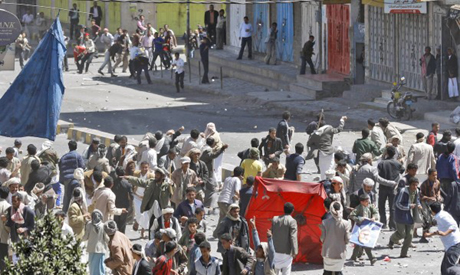
Yemeni anti-government demonstrators, background, and government supporters, hurl stones at each other during clashes in Sanaa, Yemen, Thursday 17 February 2011. (AP)
Crowds of rival demonstrators thronged the Yemeni capital and two other cities on Friday in a show of strength between President Ali Abdullah Saleh's supporters and those demanding an end to his 32 years in power.
In the biggest display of anti-government feeling, tens of thousands of protesters gathered in Hurriya (Freedom) Square in Taiz, about 200 km (120 miles) south of the capital Sanaa, witnesses said.
"Down with the dictator, down with oppression," chanted the demonstrators, who have camped out for days in imitation of Egyptian demonstrators in Cairo's Tahrir Square.
At least 10,000 Saleh loyalists also took to the streets of the busy commercial city.
Saleh, a US ally against a Yemen-based al Qaeda wing that has launched attacks at home and abroad, is struggling to end month-old protests flaring across the impoverished country.
In Sanaa, thousands of anti-Saleh protesters marched down University Street, shouting "You're next after Mubarak, Ali" and holding signs saying "Leave, leave for the sake of our future".
Hundreds of Saleh loyalists gathered near Sanaa University, shouting "No to chaos, no to sabotage," as a small group broke away and attacked anti-Saleh protesters with sticks and rocks.
State television said a million people had gathered in Taiz, a city of four million, to voice support for the 68-year-old leader, who has been in power for more than three decades.
"Yes to unity and stability, no to chaos and sabotage," the loyalists shouted, echoing a statement made by Saleh a few days earlier warning that people implementing a "foreign agenda" were sparking protests to create chaos in the Arab world.
In Hurriya Square, set up first-aid and food tents, and organised groups to try and prevent Saleh supporters from entering the square.
Some analysts see Taiz, which has a sizeable middle class and groups people from both north and south, as a barometer for the protest movement in Yemen, which has gathered strength since Tunisians and Egyptians toppled their presidents this year.
"Sanaa is important, but if Taiz really gets going this thing could take off," Gregory Johnsen, a Princeton University scholar, said in his blog on Yemen, Waq al-Waq.
Saleh, whose country is mired in poverty, is also struggling to quash al Qaeda militants, defuse a southern separatist revolt and maintain a shaky truce with northern Shi'ite rebels.
In a sop to protesters, he has promised to step down when his term ends in 2013 and not hand power to his son.
A coalition of opposition parties, which had laid on rallies that drew tens of thousands, has now agreed to talk to him, but smaller, more spontaneous protests have continued, organised by students and others using mobile text messages and Facebook.
One protester in Sanaa, Abdullah Mahyub, said: "After 30 years of oppression, we have no demand other than that this corrupt regime leaves."
A lawyer named Abdelmaeen Al-Qadi, said: "All we want is the fall of this regime and an end to corruption."
Thousands of protesters turned out in the southern port city of Mukalla. Police fired in the air and used tear gas to try and disperse them. Three people were wounded, protesters said.
Four people were killed in Aden on Thursday and two on Wednesday by what local officials called "random gunfire" as police in the port city tried to disperse the crowds.
Short link: